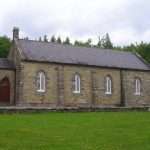Sermon for Palm Sunday, 20th March 2016
“Blessed is the king who comes in the name of the Lord!” Luke 19:38
Those of us of an older generation will remember a radio programme called Twenty Questions, perhaps we played the game ourselves. Twenty questions in which to find out the object of which a person was thinking. At the beginning of each round, the questioners would be told whether the object was animal, vegetable or mineral and the questions had to be ones which could be answered “yes” or “no.”. To identify an object in twenty questions was perhaps not so hard, had they tried to identify events, it would have been almost impossible.
The ride into Jerusalem is an event in which animal, vegetable and mineral combine to declare the glory of Jesus.
The animal is chosen carefully. In Saint Luke Chapter 19 Verses 30-31 Jesus instructs some of his disciples, “Go into the village ahead of you, and as you enter it you will find tied there a colt that has never been ridden. Untie it and bring it here. If anyone asks you, ‘Why are you untying it?’ just say this: ‘The Lord needs it.'” The animal is going to be used as a declaration of who it is that is riding into the city. The people knew their Scriptures, in the prophet Zechariah Chapter 9 Verse 9, they would have read,
Rejoice greatly, O daughter Zion!
Shout aloud, O daughter Jerusalem!
Lo, your king comes to you;
triumphant and victorious is he,
humble and riding on a donkey,
on a colt, the foal of a donkey.
The donkey may have been a declaration of the lowliness of Jesus when compared with the horses that would have been ridden by the imperial rulers, but that humble animal was also a declaration that Jesus was the awaited king, the Messiah riding into his city.
Would we have recognized Jesus? Would we have known our Scriptures well enough to understand what was happening? Had the Messiah arrived among us as a humble man, would we have recognized him? Were Jesus to walk among us today, how would we expect him to be?
The donkey is the animal that declares the glory of Jesus; the vegetable is the palm tree. Saint Luke does not mention the palms, only saying in Verse 36, “As he rode along, people kept spreading their cloaks on the road.” However, in Saint Mark Chapter 11 Verse 8, we read, “Many people spread their cloaks on the road, and others spread leafy branches that they had cut in the fields,”a description we also find in Saint Matthew Chapter 21 Verse 8.
There are many references to trees in the Old Testament, including verses in which the trees themselves welcome the arrival of God. In Psalm 96 Verses 12-13, we are told “Then shall all the trees of the forest sing for joy before the Lord; for he is coming, for he is coming to judge the earth.” If we read Isaiah Chapter 55 Verses 12-13, God says that he has sent out his word and his word “shall accomplish that which I purpose, and succeed in the thing for which I sent it.” Because God’s purpose has been accomplished, because it has succeeded, God’s people “shall go out in joy,
and be led back in peace,” and creation itself will be celebrating what God has done, “the mountains and the hills before you shall burst into song, and all the trees of the field shall clap their hands.” The trees will celebrate the arrival of God.
The donkey, the animal, asks us if we would recognize the Messiah; the palm trees, the vegetable, asks us are we joyful in our faith? If we believe the Good News it is the best news we will ever receive, does it make us different people? Does it make us sing for joy?
The stones are the mineral part of the story and the stones declares the glory of Jesus. In Verses 39-40, we read, “Some of the Pharisees in the crowd said to him, ‘Teacher, order your disciples to stop.’ He answered, ‘I tell you, if these were silent, the stones would shout out.'”
In the Old Testament, stone has been a symbol of opposition to God, only by taking away people’s hearts of stone can God get his people to turn to him. God says, in the prophet Ezekiel Chapter 11 Verses 19-20, “I will remove the heart of stone from their flesh and give them a heart of flesh, so that they may follow my statutes and keep my ordinances and obey them. Then they shall be my people, and I will be their God.” Jesus has had such a profound impact that it is as if the very stones along the road have been changed, have been brought alive, have been given a voice to say who it is that is passing by.
If the donkey asks us about recognition and the palm trees ask us about joy, the stones ask us about declaring our faith. If the disciples had kept silent, Jesus says that the stones in the road would have shouted out. Are we too often like the people in the days of Ezekiel people with hearts of stone, people unmoved by what we believe, or are we prepared to speak? If the stones themselves would have something to say, can we remain silent?
Animal, vegetable, mineral, each declaring the glory of Jesus. If we were asked twenty questions about our faith, would we be found to be declaring his glory?



Comments
Sermon for Palm Sunday, 20th March 2016 — No Comments
HTML tags allowed in your comment: <a href="" title=""> <abbr title=""> <acronym title=""> <b> <blockquote cite=""> <cite> <code> <del datetime=""> <em> <i> <q cite=""> <s> <strike> <strong>